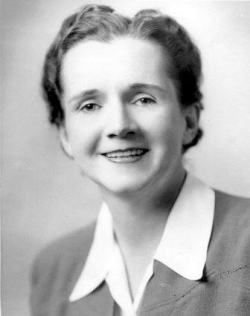Rachel Carson

Rachel Carson
- Born
- 27 May 1907
- Died
- 14 April 1964 (age 56)
Rachel Carson’s attack on the use of DDT did far more than restrict the application of this pesticide, it also served to challenge a conception of science which had guided policy in the post-war world.
In 1964 with the publication of her best known work, Silent Spring, Carson urged a radical change in the way in which people saw the relationship between humanity and nature.
As a child Carson did not dream about becoming a famous scientist, as her ambitions were rather more literary. She dreamt of being a writer and was fairly successful, as several of the stories she wrote as a youngster were published. But in her fictional work there was always an understanding of nature’s overwhelming power.
She studied at the Pennsylvania College for Women and switched from majoring in English to Biology in 1928. She kept up contributing to its newspaper and literary supplement, and it was this flair with the written word that was crucial to Carson’s success. Other scientists had written about the damaging effects pesticides were having on the environment, but none wrote like Carson. She combined passion, empirical evidence and a poetic writing style to ensure that Silent Spring was a work which could not be ignored.
Before Silent Spring, a single solution had been diagnosed for the 'insect problem', which was the complete eradication of insects through pesticides. Carson saw this as both an arrogant attitude towards nature as it assumed that humans had the right to control their environment through destructive means, and as a fundamental misunderstanding of the complex results arising from interfering with the environment.
Those who dwell, as scientists or laymen, among the beauties and mysteries of the earth are never alone or weary of life.
Rachel Carson, The Sense of Wonder, 1965
Pesticides, thought Carson, were misnamed. She preferred the term biocides as she put forward that the effects of such chemicals were rarely limited to creatures deemed as pests. DDT was at the heart of her argument. Carson questioned the logic of spraying this untested chemical without knowing about its effects on ecology or human health.
Carson passed away before being able to witness the impact of her work. She was a pioneering individual who took on the scientific establishment to expose not only effects of chemicals, but also the effects of an unquestioning attitude towards the application of scientific knowledge.
This page was written by a Biology: Changing the World volunteer.



